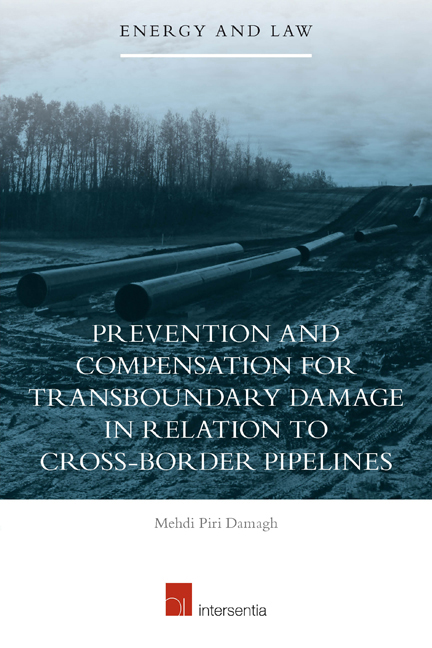Book contents
- Frontmatter
- Dedication
- Acknowledgements
- Contents
- Abbreviations
- List of Tables and Maps
- Chapter 1 Introduction
- PART I INTRODUCTORY ISSUES: PIPELINES, THE NATURE OF RISKS ASSOCIATED WITH PIPELINES AND THEIR REGULATORY REGIMES
- PART II PREVENTION OF CROSS-BORDER PIPELINE ACCIDENTS – MEANS AND SOURCES
- PART III STATE RESPONSIBILITY FOR TRANS-BOUNDARY DAMAGE CAUSED BY PIPELINES
- Summary
- Bibliography
- Valorisation Addendum
- Curriculum Vitae
- Frontmatter
- Dedication
- Acknowledgements
- Contents
- Abbreviations
- List of Tables and Maps
- Chapter 1 Introduction
- PART I INTRODUCTORY ISSUES: PIPELINES, THE NATURE OF RISKS ASSOCIATED WITH PIPELINES AND THEIR REGULATORY REGIMES
- PART II PREVENTION OF CROSS-BORDER PIPELINE ACCIDENTS – MEANS AND SOURCES
- PART III STATE RESPONSIBILITY FOR TRANS-BOUNDARY DAMAGE CAUSED BY PIPELINES
- Summary
- Bibliography
- Valorisation Addendum
- Curriculum Vitae
Summary
Currently pipelines are the most effective and most frequently used instrument for the transportation of natural gas and for the land-based transportation of oil. While pipelines are largely laid within the national borders of a country, there are many pipelines which stretch beyond national borders, turning the transportation of oil and gas from a domestic issue to an international business. When crossing international borders, pipelines fall under a different regulatory framework, characterizing them as cross-border pipelines. Due to geopolitical, security and economic reasons, cross-border pipelines have a wide range of stakeholders including, the source state(s), affected state(s), investors, developers and local communities. Such a broad range of different interests, including economic, political, environmental and social interests, may lead to conflicts of interest. If one looks at the types and extent of harm that have been incurred from the construction and operation of cross-border pipelines, it is clear that many of these harms are preventable. In particular in the case of cross-border pipelines, which are extended across a widespread geographical area, a wider range of risks and vulnerabilities are expected. As showed in the thesis, pipelines, have already caused serious accidents. Meanwhile, according to published data, cross-border pipelines have led to a lower number of accidents compared to cross-country pipelines. It was argued that apparently parties involved in such projects typically try to prevent pipeline accidents and, in the case of an accident, try to minimize incurred harm by the most appropriate means. However, one of course can also hold that due to political and economic reasons parties involved are not eager to publish the details of accidents when they are not obliged to do so.
Accident reports show that there still is a large number of oil and gas pipeline accidents, imposing personal injuries on victims, creating environmental damage and economic losses. Therefore, additional safety and environmental regulations may be necessary to increase the level of safety and to enhance the enforcement of rules designed to prevent incidents. It was shown that a variety of different standards are used, more particularly technical standards, safety standards and environmental regulations, and that those emanate from different sources.
- Type
- Chapter
- Information
- Prevention and Compensation for Transboundary Damage in Relation to Cross-border Oil and Gas Pipelines , pp. 437 - 440Publisher: IntersentiaPrint publication year: 2015



